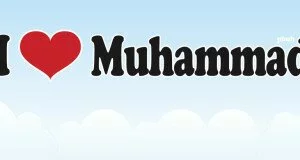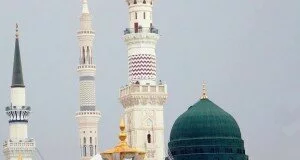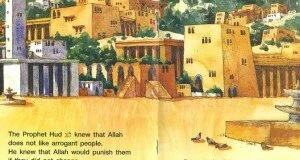The stone-heartedness of the Meccans, however, forced the Propher S.A. to turn his attention to Ta’if where he hoped the people might respond to him. He went there with a companion of his, Zayd, the freed slave, and approached the family of ‘Umayr who were reckoned among the nobility of the town. But to his disappointment, all of them turned a deaf ear to his message. For ten days he stayed there delivering his message to several people, one after another, but all to no purpose. “Stirred up to hasten the departure of the unwelcome visitor, the people hooted him through the streets, pelted him with stones and at last obliged him to flee from the city pursued by a relentless rabble. Blood Flowed down upon his legs; and Zayd, endeavoring to shield him was wounded in the head. The mob did not desist until they had chased him two or three miles across the sandy plains to the foot of the surrounding hills. There wearied and exhausted, he took refuge in one of the numerous orchards, and rested against the wall of a vineyard.
That day little did even his unwavering faith anticipate that in less than ten years he would stand up to the spot at the head of a conquering army, and that great idol of Ta’if despite the entreaties of its votaries, would be demolished at his command.”
Nearby was the vineyard belonging to ‘Utbah and Shaybah, sons of Rabi’ah the wealthy citizens of Mecca watched with pain the condition of the Holy Prophet and Moved by compassion, sent to him one of their Christain servants with a tray of grapes. The Holy Prophet S.A. accepted the fruit with pious invocation: “In the name of Allah” The Christian servant Addas was greatly impressed by these words and said: “These are the words which the people of this land do not generally speak” The Prophet inquired of him whence he came and what religion he professed. Addas replied: “I am a Christian by faith and come from Nineveh.” The Prophet then said: “You belong to the city of righteous Janah, son of Matta.” Addas asked him anxiously if he knew anything about Janah. The Prophet significantly remarked: “He is my brother. He is a Prophet and so am I” Thereupon Addas paid homage to Muhammad S.A. and kissed his hands. His masters admonished him at this act but he replied: “None on the earth is better than he. He has revealed to me a truth which only a prophet can do.” The master again reprimanded him and said: “We forewarn you against the consequences of abandoning the faith of your forefathers. The religion which you profess is far better than the once you feel inclined to.”
At a time when the whole world seemed to have turned against him Muhammad S.A. turned to his Lord and betook himself to prayer and the following touching words are still preserved as those through which his oppressed soul gave vent to its distress. He was weary and wounded but confident of the help of his Lord:
O Lord! To thee alone I make complaint of my helplessness, the paucity of my resources and my insignificance before mankind. Thou art the most Merciful of the mercifuls. Thou art the Lord of the helpless and the weak. O Lord of Mine! Into whose hands wouldst thou abandon me: into the hands of an unsympathetic foe who would sullenly frown at me, or to the enemy who has been given control over my affairs? But if thy wrath does not fall upon me, there is nothing for me to worry about…. I seek protection in the light of Thy Countenance, Which illuminates the heavens and dispels every darkness, and which controls all affairs in this world as well as in the Hereafter. May it never be that I should incur Thy wrath of that Thou should be wrathful to me. And there is no power nor resource, but Thane alone.
No one can read this Prayer without having deepened within him a sense of the Majesty of God, the completeness of His over ruling providence, His concern with the minutest detail of human life. This prayer affords an insight into the working of the Prophet’s mind and once can easily read in it the loftiness of his thinking, the purity of his spirit, and the nobility of his feelings. There is no prevarication, no hiding or suppression of truth, no luxuriant display of poetic fancy but a spontaneous expression of his deep love for Allah, his implicit faith in His mercy and help and his cheerful resignation to the Will of the One Who dwells in majesty over all the creation in invisible inseparable omnipotence, far above the humanly conceivable –the eternal cause of all effects.
It is hard to believe that an imposter can give vent to emotions so noble. Only prophet who has direct communion with his Creator is capable of gibing utterances to such things. They seem to have emanated direct from the inner springs of life. He is homeless, miserable, yet so calm and so firm. His words, pure and simple, eminently reflect that Muhammad S.A. had none of those painful cleavages of the sprit, those phantoms of fear, greed, and inhibition that are commonly found in the outpourings of the impostors. “All earnest souls will ever discern in it the faithful struggle of an earnest soul towards what is good and best. Struggle often baffled, sore baffled down as into entire wreck yet a struggle never ended even with tears, repentance, and true unconquerable purpose, begun anew.”
“There is something lofty and heroic,” observes William Muir in the journey of Muhammad to Tayif a solitary man despised and rejected by his own people, going boldly fourth in the name of Allah like Janah to Nineveh and summoning an idolatrous city to repent and support his mission. It sheds a strong light of the intensity of his belief in the divine origin of his calling.
Muhammad S.A. had been tortured in numerous ways, but as he had a strong and influential family the Banu Hashim, at his back, he was generally not subjected to any severe bodily violence for fear that such action would provoke retaliation. Among his followers, the brunt of the physical torture was borne by slaves such as Bilal and Amir b. Fuhayrah.
 Muslim Blog Muslim Blog
Muslim Blog Muslim Blog




